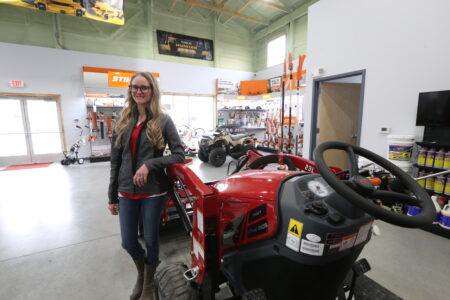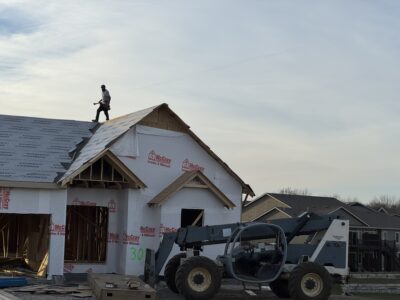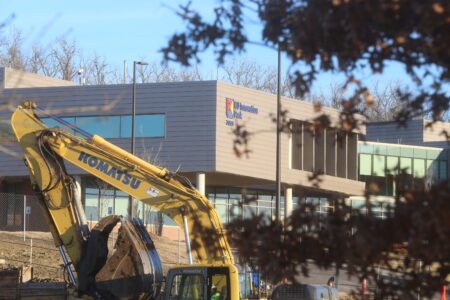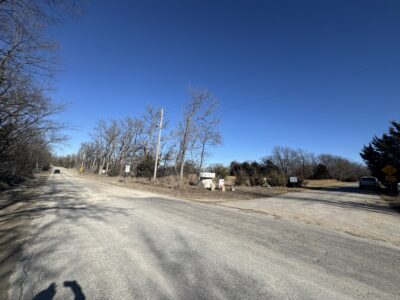
Local vo-tech school gets new leader, plans to more than double enrollment

photo by: Nick Krug
The Dwayne Peaslee Technical Training Center, 2920 Haskell Avenue, Suite 100.
Lawrence’s Peaslee Tech has hired a new executive director, and he has a plan to grow the vo-tech school to more than 1,000 students in the next three to five years.
Kevin Kelley, who begins as executive director on Oct. 2, also can tell you why the glue on an envelope tastes so bad, which surprisingly helped him land the top job at Peaslee Tech.
Kelley is the former president of Kansas City-based IPAC Corp., which makes industrial adhesives, including the glue you lick on an envelope. Leaders with Peaslee Tech said Kelley’s background as a business owner was a key reason the nonprofit board hired him to lead the school.
“He understands technical training because he had his own plant,” said Shirley Martin-Smith, chair of the Peaslee Tech board. “He understands the need to have trained employees. I think he relates very well to the business community.”
As for the bad-tasting envelopes, the reason behind that is simple. The industry could never agree on a flavor for the glue.
“We could never find a taste that worked for everybody,” he said.
Kelley, 63, ran IPAC Corp. from 1985 to 1995. Upon selling that business, Kelley decided to pursue a relatively new-found interest. He had been teaching business classes part time for an area community college. Kelley went back to school to get his master’s and doctoral degrees, then moved into the world of academia.
Kelley had stints with the University of St. Mary in Overland Park and Donnelly College, and he was the director of business and community development for Metropolitan Community College-Institute for Workforce Innovation.
Kelley has been with Peaslee Tech for about three months, serving as the school’s program manager. Kelley, who lives just a few blocks from the school near 31st and Haskell, previously had served as a volunteer at Peaslee Tech.
He comes to the job with ideas on what needs to happen at the school, which was founded as a joint effort of the city, county, chamber of commerce, school district, local economic development leaders and community colleges in the region.
“To support the workforce pipeline in Douglas County, we need to be serving about 1,000 people per year, and I project we need to do that in the next three to five years,” Kelley said.
The school currently has about 400 students and about 16 program offerings, ranging from building and industrial trade programs to IT and health care training. Kelley said he would like to see the program offerings grow to about 24 in the next few years.
Kelley said a key milestone for the school will be receiving accreditation from the Kansas Board of Regents. Kelley said work is underway for Peaslee Tech to become accredited as a private, nonprofit educational institution. If that designation is received, it will open up new avenues for students to receive financial aid to attend the school.
The school itself, though, also is trying to figure out its finances. As we’ve reported, Peaslee Tech has an approximately $1.5 million balloon payment due on its mortgage in January. While the city and county provide funding to Peaslee Tech, neither government has agreed to fully fund the balloon payment. That has left leaders with Peaslee Tech and the chamber looking to negotiate a deal with a consortium of area lenders to refinance the mortgage for one to two years. A deal has not yet been struck, but Martin-Smith said leaders are still optimistic a deal will be reached before the end of the year.
Such a deal is critical for the short term, but Kelley said the school needs to have a longer term plan for its finances. He said Peaslee Tech likely needs to turn to something that most every other college uses: an endowment.
“That is a recommendation I have made,” Kelley said. “We need to develop a Peaslee Foundation. We’ll see what form it takes, but it needs to be an important part of our sustainability.”
Kelley said the school also will continue to rely on grants and tuition, and likely will have discussion with the Lawrence school district about funding issues. Peaslee Tech does currently serve a number of high school students who receive both high school and college credits. While some of the community colleges that partner with Peaslee Tech get money from the school district, Peaslee Tech itself does not get any money from the school district. Kelley is hoping that will change.
Kelley also is planning on continued support from Douglas County and the city of Lawrence, both of which have been providing between $150,000 to about $300,000 in annual funding for the school.
“We want continued support from the city and county governments in some method,” Kelley said. “But it doesn’t really have to be an annual stipend. There are other ways we can work with them.”
Kelley said working with local governments would be a big part of his job. He has experience in that realm too. While he was a business leader in Kansas City, Kan., he served as the chairman of the citizen task force that successfully lobbied for the consolidation of Kansas City, Kan., and Wyandotte County governments. He became involved in that effort, which involved hours of communication with government officials at the state and local level, because of rising business costs in Kansas City.
“Our taxes were soaring,” he said. “It wasn’t going too well, and I felt like I needed to try to do something.”
One other funding model that has been mentioned for Peaslee is that the school become a full-fledged public institution governed by the Kansas Board of Regents. That would require a legislative act, but would give the school taxing authority. Kelley said the idea is worth exploring, but he stopped short of endorsing it.
He said there are some significant advantages to being a private, nonprofit school. One of the main ones is greater flexibility to add new programs to meet the changing needs of the community.
Kelley, who grew up in Lawrence, said he believes changing educational needs will need to be addressed in coming years. That may create some challenges, but he said it also can create great satisfaction as the school adapts and meets the needs of area residents.
“When you are doing this well, every day you are helping people get a job or get better at a job,” Kelley said. “There is really not much better work to do.”







